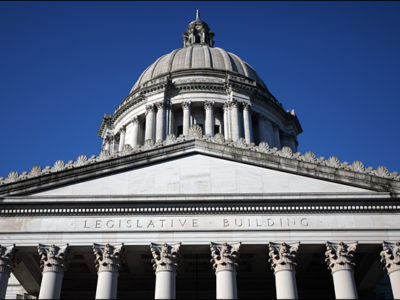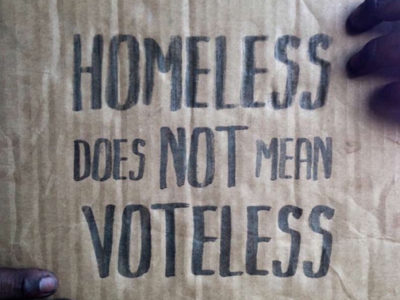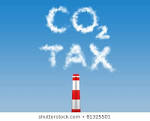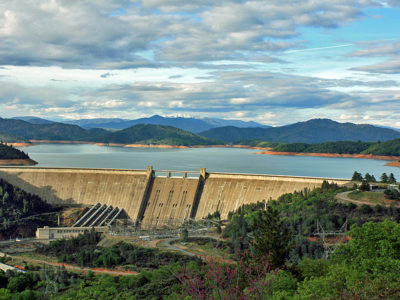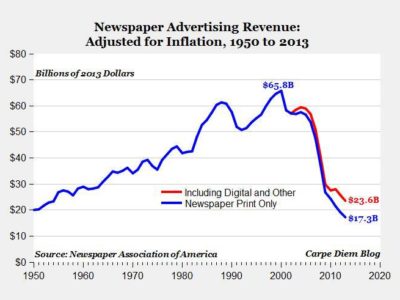Region: National
Journalism and Political Polarization
Reporters Might Hold A Key To Improving Environmental Politics
It’s no surprise that American politics has gotten significantly more polarized over the last three decades, so it stands to reason that legislatures have gotten more polarized as well. But in a recent article in the Journal of Political Economy by James Snyder and David Stromberg, brought to my attention by Professor Seth Masket writing …
Continue reading “Journalism and Political Polarization”
CONTINUE READINGCan Voter Registration Combat NIMBYism?
Homeless Voting Can Change the Urban Political Calculus
NIMBY land use politics stems from a classic political process failure: the people who would benefit from more housing do not yet live in the jurisdiction where it will be built — and for the most part, do not even know that they will be the ones who will live there. Thus, local officeholders have …
Continue reading “Can Voter Registration Combat NIMBYism?”
CONTINUE READINGHappy Tax Day!
It’s the perfect time to talk about a carbon tax.
Justice Oliver Wendell Holmes once said that taxes are the prices we pay for a civilized society. A carbon tax, if we ever get one, might turn out to be the price we pay for a sustainable planet. I’m not wedded to it as a tool for cutting carbon, and I don’t think it would …
Continue reading “Happy Tax Day!”
CONTINUE READINGWhat Else Should Congress Investigate?
Understandably, a lot of attention is focused on the White House. But other issues cry out for investigation.
Every day, it seems that there is a headline about some investigatiion involving tcampaign finance violations, the White House, or the actions of some foreign power. Perhaps that’s all the bandwidth that Congress has. But there are other areas calling out for inquiry. Here are just a few: CAFE Standards. The car industry asked for …
Continue reading “What Else Should Congress Investigate?”
CONTINUE READINGTrump Administration’s Cold Water War With California Turns Hot
Feds’ Curious New Lawsuits Against State Water Board Likely Just the Opening Litigation Salvo
When it comes to California water policy, the federal-state relationship has always been both strained and challenging. That intergovernmental tension harkens back at least to the Reclamation Act of 1902. In section 8 of this iconic federal statute that transformed the American West, Congress declared that the federal government “shall proceed in conformity with” state …
Continue reading “Trump Administration’s Cold Water War With California Turns Hot”
CONTINUE READINGGoodbye, Cleveland!
Newspaper Collapse Threatens The Environment: Universities Need To Fill The Gap
In 1970, Cleveland’s Cuyahoga River famously caught fire. This past week, we have seen an even worse environmental disaster for the city: The Plain Dealer on Monday laid off 14 newsroom employees as part of a staff reduction first announced in December. The 14, most of them reporters and all members of Local 1 of …
Continue reading “Goodbye, Cleveland!”
CONTINUE READINGEconomists vs. Environmentalists: Time for Deténte?
You don’t have to love economics to see it as a possible ally.
Cost-benefit analysis has long been the target of environmentalist ire. But one lesson of the Trump years has been that economic analysis can be a source of support for environmental policy — it is the anti-regulatory forces who have to fudge the numbers to justify their actions. Most energy and environmental economists are aghast at …
Continue reading “Economists vs. Environmentalists: Time for Deténte?”
CONTINUE READINGReviving LBJ’s Vision
Maybe What We Need is a Green Great Society
Talk about a Green New Deal is rife these days, but perhaps what we should be talking about instead is a Green Great Society. Actually, Lyndon Johnson’s vision of the great society was green from the get-go, so maybe we could just call for a renewed Great Society. What the Great Society is known for …
Continue reading “Reviving LBJ’s Vision”
CONTINUE READINGDuke Sucks: The Legal Planet March Madness Special
Why Is The University Killing Light Rail In The Research Triangle?
Like most people of intelligence and character, when it comes to NCAA basketball, I despise the Duke Blue Devils. As the precocious son of a good friend notes, “you can’t spell Blue Devil without evil.” I acknowledge Mr. Mxyzptlk’s Mike Krzyzewski’s greatness as a basketball coach, but it’s too much to put up with garbage quotations …
Continue reading “Duke Sucks: The Legal Planet March Madness Special”
CONTINUE READINGTrump’s “Great Honor” to Fund the Great Lakes Restoration Initiative is a Great Falsehood
Trump Mischaracterizes His Administration’s Attempt to Defund Important Program to Protect Environmental Quality in the Great Lakes
Late last week, Donald Trump promised to fully fund the Great Lakes Restoration Initiative, a program of the Environmental Protection Agency that provides resources to address environmental quality issues in the Great Lakes. His hollow promise obscures the fact that the Trump administration has worked hard to dismantle this program through taking away its funding, and …
CONTINUE READING



